Related Research Articles
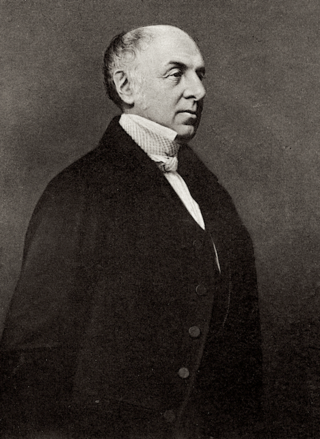
Sir James Robert George Graham, 2nd Baronet was a British statesman, who notably served as Home Secretary and First Lord of the Admiralty. He was the eldest son of Sir James Graham, 1st Baronet, by Lady Catherine, eldest daughter of the 7th Earl of Galloway.

Earl of Lonsdale is a title that has been created twice in British history, firstly in the Peerage of Great Britain in 1784, and then in the Peerage of the United Kingdom in 1807, both times for members of the Lowther family.

Susanna Blamire was an English Romantic poet, sometimes known as 'The Muse of Cumberland' because many of her poems represent rural life in the county and, therefore, provide a valuable contradistinction to those amongst the poems of William Wordsworth that regard the same subject, in addition to those of the other Lake Poets, especially those of Samuel Taylor Coleridge, and in addition to those of Lord Byron, on whose The Prisoner of Chillon her works may have had an influence. Blamire composed much of her poetry outside, sat beside a stream in her garden at Thackwood. She also played the guitar and the flageolet, both of which she used in the process of the composition of her poetry.

Carlisle is a constituency in Cumbria represented in the House of Commons of the UK Parliament since 2010 by John Stevenson of the Conservative Party.
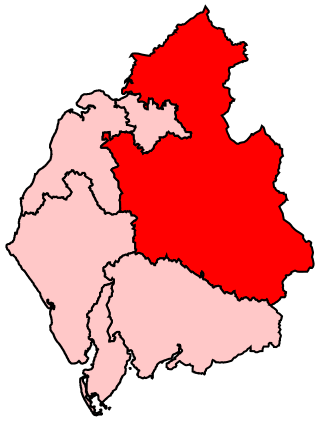
Penrith and The Border is a constituency in Cumbria represented in the House of Commons of the UK Parliament since 2019 by Neil Hudson, a Conservative.

Musgrave Lewthwaite Watson was an English sculptor of the early 19th century.
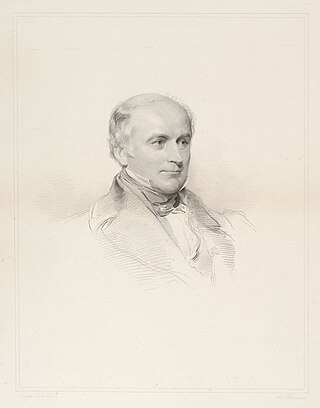
Henry Bickersteth, 1st Baron Langdale, PC, a member of the prominent Bickersteth family, was an English physician, law reformer, and Master of the Rolls.
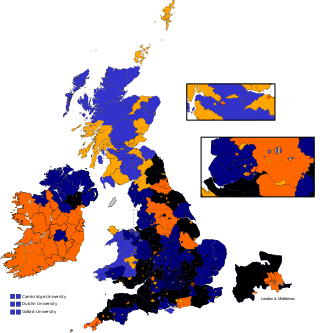
East Cumberland is a former county constituency in the House of Commons of the Parliament of the United Kingdom. It elected two Members of Parliament (MPs) by the bloc vote system of election.
Colonel Henry Cecil Lowther, DL, JP was an English Conservative politician and an amateur cricketer who played first-class cricket from 1819 to 1843. His long service in the House of Commons saw him become the Father of the House.
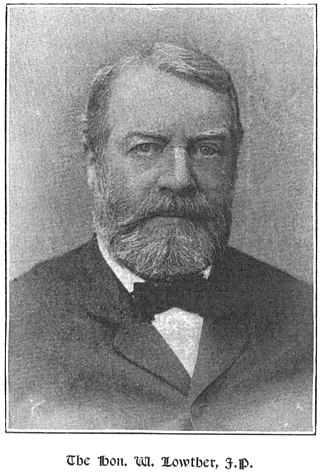
William Lowther JP DL was a British diplomat and Conservative politician who sat in the House of Commons from 1868 to 1892.
The sheriff is the oldest secular office under the Crown. Formerly the sheriff was the principal law enforcement officer in the county but over the centuries most of the responsibilities associated with the post have been transferred elsewhere or are now defunct so that its functions are now largely ceremonial. The sheriff changes every April.
The Baronetcy of Dalston of Dalston was created in the Baronetage of England on 15 February 1641 for William Dalston of Dalston Hall, near Carlisle, Cumbria.
The High Sheriff of Galway Town was the Sovereign's judicial representative in the county of the Town of Galway. Initially an office for lifetime, assigned by the Sovereign, the High Sheriff became annually appointed from the Provisions of Oxford in 1258. Besides his judicial importance, he had ceremonial and administrative functions and executed High Court Writs.

Robert Anderson (1770–1833), was an English labouring class poet from Carlisle. He was best known for his ballad-style poems in Cumbrian dialect.
The High Sheriff of Roscommon was the British Crown's judicial representative in County Roscommon, Ireland from 1575 until 1922, when the office was abolished in the new Free State and replaced by the office of Roscommon County Sheriff. The sheriff had judicial, electoral, ceremonial and administrative functions and executed High Court Writs. In 1908, an Order in Council made the Lord-Lieutenant the Sovereign's prime representative in a county and reduced the High Sheriff's precedence. However the sheriff retained his responsibilities for the preservation of law and order in the county. The usual procedure for appointing the sheriff from 1660 onwards was that three persons were nominated at the beginning of each year from the county and the Lord Lieutenant then appointed his choice as High Sheriff for the remainder of the year. Often the other nominees were appointed as under-sheriffs. Sometimes a sheriff did not fulfil his entire term through death or other event and another sheriff was then appointed for the remainder of the year. The dates given hereunder are the dates of appointment. All addresses are in County Roscommon unless stated otherwise.
The High Sheriff of Longford was the British Crown's judicial representative in County Longford, Ireland from the 16th century until 1922, when the office was abolished in the new Free State and replaced by the office of Longford County Sheriff. The sheriff had judicial, electoral, ceremonial and administrative functions and executed High Court Writs. In 1908, an Order in Council made the Lord-Lieutenant the Sovereign's prime representative in a county and reduced the High Sheriff's precedence. However the sheriff retained his responsibilities for the preservation of law and order in the county. The usual procedure for appointing the sheriff from 1660 onwards was that three persons were nominated at the beginning of each year from the county and the Lord Lieutenant then appointed his choice as High Sheriff for the remainder of the year. Often the other nominees were appointed as under-sheriffs. Sometimes a sheriff did not fulfil his entire term through death or other event and another sheriff was then appointed for the remainder of the year. The dates given hereunder are the dates of appointment. All addresses are in County Longford unless stated otherwise.

Stockdalewath is a small village in Cumbria, approximately 7.5 miles south of Carlisle in the extreme northwest of England. It is located on the River Roe, and is in the civil parish of Dalston.
Henry Lonsdale M.D. (1816–1876) was an English physician, now known as a biographer.
Colonel Hampden Clement Blamire Moody was the Commander of the Royal Engineers in China at the height of the British Empire and throughout the Second Opium War and the Taiping Rebellion.
Lord Lonsdale's ninepins, Sir James's ninepins, or Lowther's ninepins, was a derogatory label applied to certain Members of Parliament during the Georgian era who owed their Parliamentary seats to the patronage of James Lowther, 1st Earl of Lonsdale (1736–1802).
References
- Burke, Sir Bernhard (1862). A Genealogical and Heraldic History of the Landed Gentry of Great Britain and Ireland. Vol. I. London: Harrison.
- Walford, Edward (1860). The County Families of the United Kingdom. London: Robert Hardwicke.
- Maycock, Christopher Hugh (2003). A Passionate Poet: Susanna Blamire, 1747–94. London: Hypatia Publications. ISBN 1-872229-42-5.
- Sylvanus, Urban (1862). The Gentleman's Magazine. Vol. part I. London: John Henry and James Parker.
- Lonsdale, Henry (1867). The Worthies of Cumberland. Vol. I. London: George Routledge and Sons.
- Attribution
![]() This article incorporates text from a publication now in the public domain : "Blamire, William". Dictionary of National Biography . London: Smith, Elder & Co. 1885–1900.
This article incorporates text from a publication now in the public domain : "Blamire, William". Dictionary of National Biography . London: Smith, Elder & Co. 1885–1900.